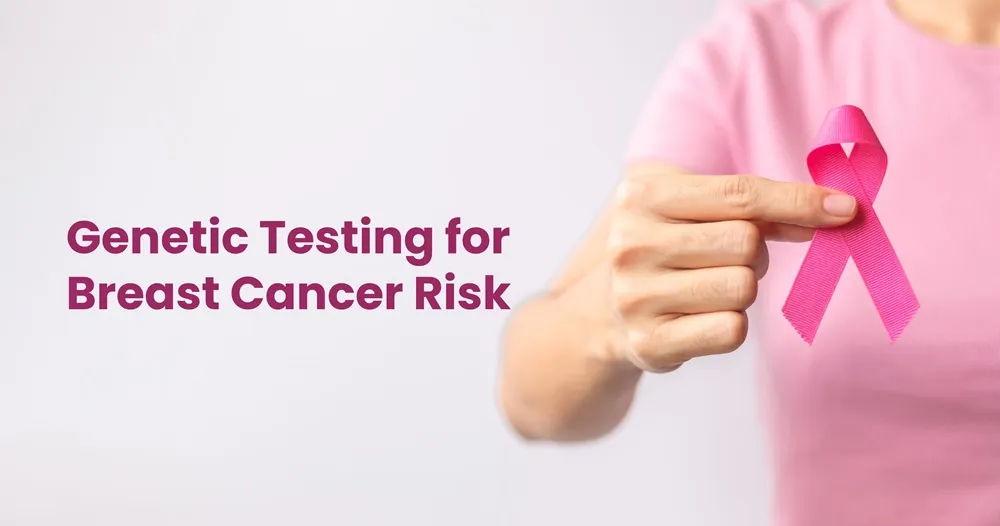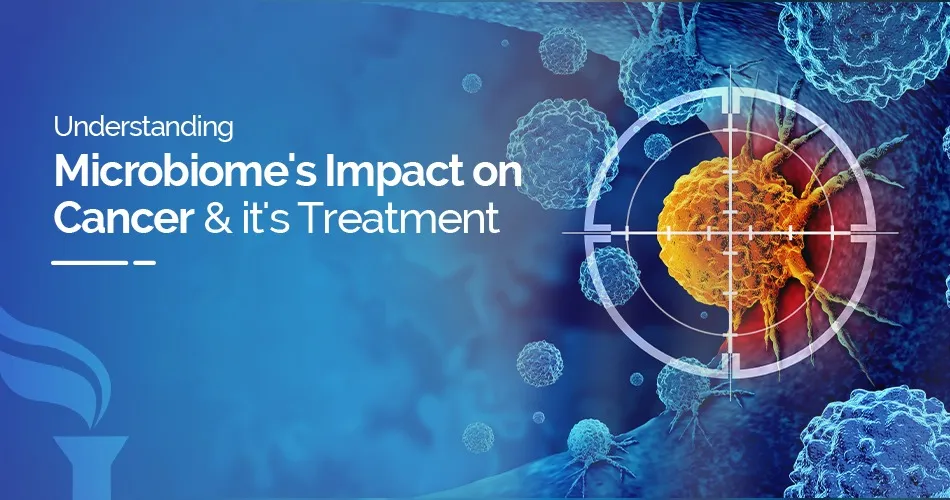Genetic Testing for Breast Cancer Risk: Understanding BRCA Mutations and Beyond
Apr 13, 2024

The human body is a complicated machine due to the complex network of genes that regulate every aspect of it, including disease susceptibility. BRCA1 and BRCA2 are two of these genes that are essential for DNA repair because they inhibit tumour growth and protect the integrity of our genetic code. Unfortunately, alterations in these genes can significantly increase the risk of acquiring certain cancers, particularly breast and ovarian cancer.
In the general population, 13% of women develop breast cancer at a certain point in their lives. In contrast, by the time they are 70–80 years old, 55%–72% of women who inherit an adverse BRCA1 mutation and 45%–69% of women who inherit an adverse BRCA2 variant will have breast cancer. BRCA mutations are important information for anyone concerned with their risk or with a family history of cancer. Here, we will understand how these mutations impact breast cancer risk and help in genetic testing of breast cancer risk.
Understanding Inherited Gene (BRCA) Mutations
BRCA gene mutations, especially the BRCA1 and BRCA2 genes, are linked with a genetic susceptibility to breast cancer. Normally, these genes are essential for repairing damaged DNA. When mutations occur, the cell's capacity to repair damaged DNA is weakened. This can allow abnormal cells to proliferate uncontrollably and raise the risk of cancer developing.
Hereditary Breast and Ovarian Cancer Syndrome (HBOC syndrome) is the term used to describe women (and men) who have one of these gene alterations.
- In addition to having a significantly higher risk of pancreatic cancer, ovarian cancer, and possibly even some other cancers, women with a BRCA gene mutation also have a significantly higher risk of breast cancer.
- Males with a BRCA gene mutation have a higher chance of developing breast cancer (though initially, this risk is lower than in women), prostate cancer, pancreatic cancer, and possibly other cancers as well.
Individuals with a family history of the disease are more likely to develop breast cancer. The majority of women who have a family history of breast cancer do not carry a hereditary gene mutation that significantly increases their risk. However, women with a strong family history of breast cancer are more likely to have an inherited gene change, especially if the family history also includes certain other cancers like ovarian, pancreatic, or prostate cancer. The risk of developing an inherited condition can be influenced by:
- An affected family member (Cancer in close relatives, like a sister or mother, is more concerning than cancer in relatives who are distant.)
- The number of affected family members
- The age at which your relatives received a diagnosis.
Who Should Think About Breast Cancer Genetic Testing?
People thinking about genetic testing for breast cancer risk should speak to their doctor to understand more. Testing may be beneficial for the following individuals who have already received a breast cancer diagnosis:
- Individuals noticed with triple-negative breast cancer
- Those with
 breast cancer that has spread to other parts
breast cancer that has spread to other parts - People with a second breast cancer diagnosis; those diagnosed at a younger age
- Individuals with a family history of ovarian, prostate, or pancreatic cancer
- Individuals with a history of breast cancer in their family, especially in males or at a younger age
- Ashkenazi's Jewish ancestry
Genetic Counselling Before Genetic Testing
To assess the possibility of an inherited cancer risk and determine whether the medical criteria for genetic testing are met,
- A genetic counsellor, advanced practitioner, or occasionally a doctor will conduct a risk assessment before the test by taking a three- to four-generation family tree.
- There will be a discussion and consideration of the implications of genetic testing, along with information about cancer, genetics, possible genetic test results, and genetic testing billing.
- Consent documents will be reviewed and signed if genetic testing for breast cancer is decided to pursue.
Genetic Testing For Breast Cancer
Genetic testing for hereditary breast and ovarian cancer looks for BRCA1 and BRCA2 gene mutations. The oncologist may recommend testing with a multigene panel, which simultaneously checks for mutations in multiple genes, including BRCA1 and BRCA2.
Genetic testing for breast cancer usually involves collecting a sample of blood, saliva, or cells from the inner layer of your cheek. The sample is then sent for analysis to a lab that specializes in BRCA genetic testing.
Getting the Results of Genetic Testing
The results are provided within two to four weeks of submitting the sample. After reviewing results, a medical expert or genetic counsellor helps understand the interpretations of teh reports. Results you may receive involve the following:
- Positive: The detection of a known gene variation that raises your risk of breast cancer.
- Negative: There is no detection of a known gene variation that increases your risk of breast cancer.
- Variant Of Unknown Significance: A variant has been noticed in a gene, such as BRCA1 or BRCA2, but its effect on breast cancer risk remains unknown.
The results of genetic testing of breast cancer can be complicated. Work with a genetic counsellor to understand what your results mean so you may prepare for the next steps.
Final Words
BRCA gene mutations play a major role in an individual's likelihood of breast cancer. Speak with your healthcare provider about receiving a consultation for genetic counselling if you believe genetic testing for breast cancer risk might be beneficial for you or your family. A genetic counsellor will go over the advantages and drawbacks of genetic testing with you during the consultation and work with you to help you make the best choice for your family.
Choose Apollo for comprehensive BRCA testing and genetic counselling. Apollo is committed to offering modern technology and caring support so that you can identify possible risks, understand your genetic blueprint, and take specific preventive measures. Book your test right now!
FAQs
1. Can I perform genetic testing at home?
You can assess your risk of breast cancer with certain at-home genetic tests. Usually, to do these tests, you have to send in a sample of your cheek cells or saliva by mail for analysis.
Rather than taking an at-home test, it is advised that you seek genetic testing from a healthcare provider.
2. How does BRCA1 or BRCA2 mutation increase the risk of developing breast and ovarian cancer?
If a woman inherits a harmful variant in either BRCA1 or BRCA2, her lifetime risk of developing breast and/or ovarian cancer is significantly increased, though the degree of increase is based on the mutation.
3. Is the cost of genetic testing for BRCA1 and BRCA2 variants covered by health insurance?
Those considering BRCA1 and BRCA2 testing should verify if their insurance includes genetic counselling and testing. Genetic counsellors can help answer questions about insurance coverage. For uninsured patients meeting specific financial and medical criteria, some genetic testing companies offer free testing for inherited BRCA1 and BRCA2 variants.
4. Are there other genes besides BRCA that can affect breast cancer risk?
Yes, other genes such as PALB2, CHEK2, and ATM are also associated with an increased risk of breast cancer. Comprehensive genetic testing may include these and other genes related to breast cancer risk.
Related Blog Post
Blog Categories
- Child Health
- Mens Health
- Women's Health
- Mental Health
- Health Myths & Facts
- Fitness
- Nutrition/Recipes
- Remedies
- Weight Management
- Stress Management
- Health Supplements
- Addiction Management
- Disease Management
- Allergy
- Anemia
- Arthritis
- Asthma
- Autoimmune Diseases
- Blood Pressure
- Cancer
- Deficiencies
- Dengue/Malaria/Chikungunya
- Diabetes
- Eye Problems
- Heart Diseases
- Hepatitis
- HIV/AIDS/STD
- Hormonal Imbalance
- Infection/Flu/Viral
- Kidney
- Liver
- Menstrual Problems
- Pregnancy
- Skin & Hair Problems
- Stomach Ailments
- Thyroid
- Others
- Health Checkups
- Diagnostics/Pathology
- Lifestyle & Wellness
- Covid
- Medical Tests
- Cholesterol
- Health Tips
- Parent Care/Old Age
- Lungs
- Food Intolerance








